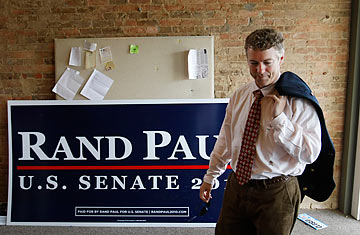
Republican Senate candidate Rand Paul arrives at his campaign headquarters in Bowling Green, Kentucky.
To-do lists are for the organized, the achievers. The Democrats have a midterm election to-do list at the ready; it looks almost exactly like the one that got Barack Obama elected president two years ago, and it's been cultivated daily with cool-headed discipline by the Obamans for months. The Republican Party of 2010, so frequently muddled and befuddled since the last presidential election, needs one too. If the GOP wants to attain any significant success this year, it's got to assemble and fulfill its own giant to-do list before November's midterms.
Of course, the party in power always has a disadvantage in midterm contests, especially when economic times are tough, so both parties really ought to be tallying and tabulating their lists, and scrutinizing the dense new data accrued from last week's primaries.
On their face, last Tuesday's major results were all bad for the Republicans. GOP'ers have spent the week spinning and dancing away from the outcomes in the contentious Kentucky Republican Senate primary (welcome to the party, Rand Paul); the Pennsylvania Democratic Senate primary (farewell, Arlen, we knew you too well); and the special election in Pennsylvania's Republican-trending 12th congressional district (a loss so chilling for the Republicans that its relative lack of press attention should make conservatives question their basic premise of an omnipresent liberal bias in the media).
The Democrats, meanwhile, have reasons to cheer, beyond the Republicans' new Rand Paul problem and the House race loss. There's Arlen Specter's loss to Congressman Joe Sestak in the Keystone State Senate race; anyone who thinks that outcome was a disappointment to the White House isn't paying enough attention. Obama and his allies agreed to back Specter in order to lure him over to the Democratic side a year ago and gain a 60th vote in the Senate. But no one on Obama's side (with the possible exception of Joe Biden, an old friend of Specter's) gives a jot about his loss. They are, in fact, delighted to have ended up with Sestak, who is seen as a stronger general election candidate against conservative Pat Toomey.
As the primaries proved, it is hard to get organized without a clear leader, and therein lies the greatest asymmetry between the two parties right now: Democrats are led clearly, in public and in private, by Barack Obama and his political team; Republicans remain essentially leaderless. (Among the GOP's ever-revolving options: RNC Chairman Michael Steele, Newt Gingrich, Senate Leader Mitch McConnell, Sarah Palin, Karl Rove, Mitt Romney and Haley Barbour.) Sure, there are Democratic intraparty disagreements, but in terms of fundraising, allocation of resources, political and policy strategy, coordination with allied interest groups, and message, the Democrats have a smooth, efficient system already in place. The Republicans do not. At the top of their to-do list should be tuning out the underlying bedlam and pulling together a workable party plan.
On the rest of the list: stay away from the kinds of fights — such as the one Dr. Paul started in Kentucky with his comments about Civil rights — that can cast the party as extreme. Take care in devising and promoting a 2010 version of the Contract with America. Play down expectations for success in public, while being wildly enthusiastic behind the scenes. Most of all, focus the broad message relentlessly on Obama's spending policies — not on Democratic ethics, competence, Supreme Court nominees or anything else the voting public considers mere luxury items when economic woes are front and center.
The Democratic 2008 playbook is already being put to use in order to limit the party's losses in November. Its tactics: Utilize Obama to raise money and frame the election's overall debate at 30,000 feet. Gradually reintroduce fallen characters — George W. Bush and Dick Cheney — into the national dialogue, building to a fall crescendo. Constantly stoke divisions between the more extreme members of the Republican Party and the center. Remove from their jobs anyone on the team who isn't competent. Present Obama as someone who can get things done in Washington for the American people, above the political fray. And, most important, a new element for 2010: aggressively promote all positive economic news.
Last Tuesday's results gave Democrats reason to be more optimistic about their chances in the midterms, and Republicans reason to worry. In recent years, the words "organized" and "disciplined" have not been too often associated with the Democratic Party, but in the Age of Obama, they represent the biggest difference between the two sides. With just five months left, closing the gap with the Democrats' sizeable organizational advantage has got to be the GOP's main to-do target.
